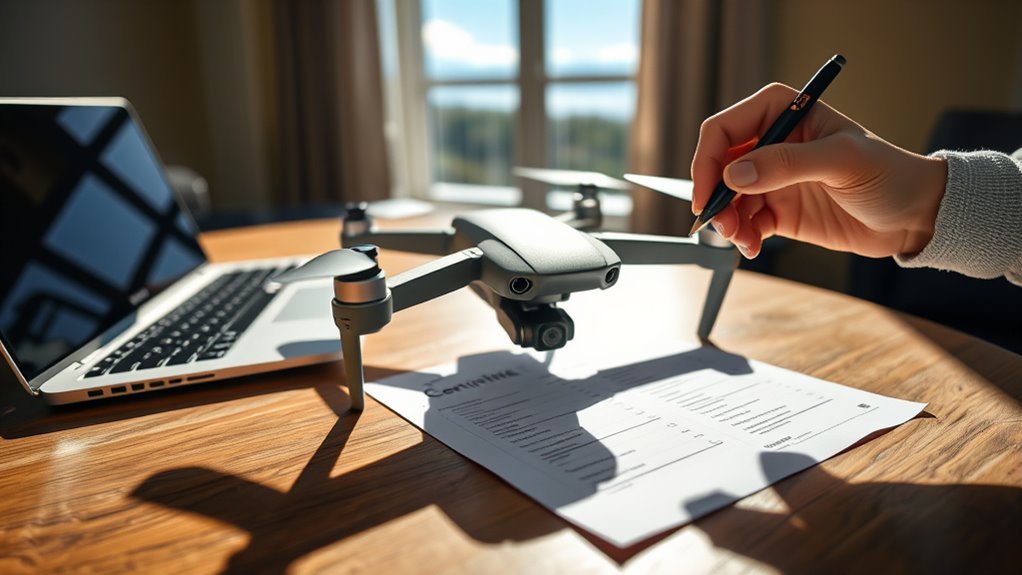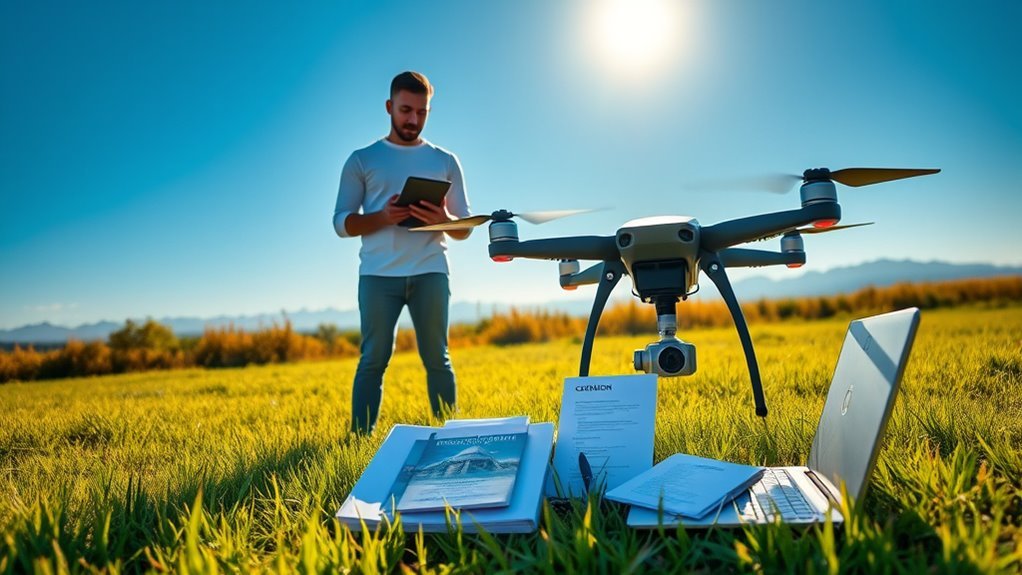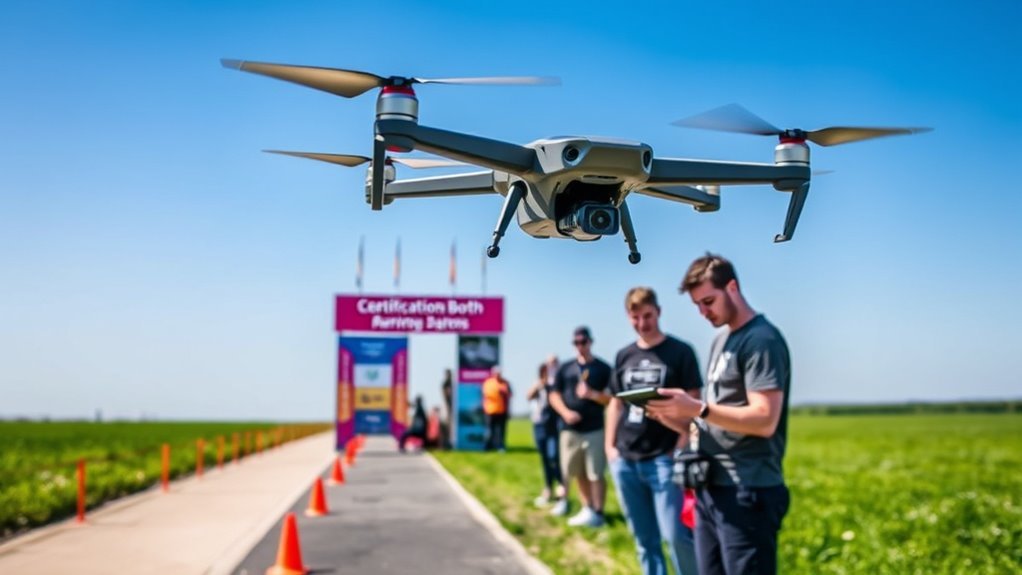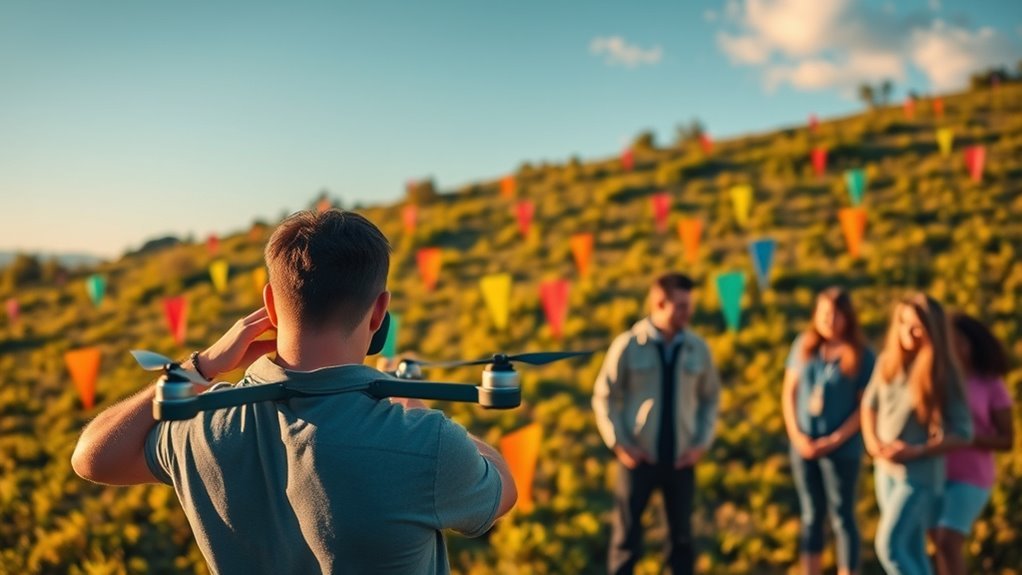To get certified for your drone today, first, understand the certification requirements like age and regulations. Next, choose the right certification program that fits your experience, whether it’s for hobby or commercial use. Then, prepare for the knowledge test using quality study materials. After that, complete a practical flight test to demonstrate your skills. Finally, maintain your certification by staying informed about regulations and participating in ongoing training. You’ll discover additional details as you explore further.
Understand the Requirements for Certification

Before you commence on your journey to get certified for your drone, it’s essential to understand the specific requirements that govern this process. Familiarizing yourself with regulatory guidelines is critical, as they dictate how you can operate safely and legally. You’ll need to know the age restrictions, knowledge tests, and flight proficiency expectations that apply in your region. Compliance with these guidelines not only guarantees your certification but also enhances drone safety, protecting both you and others. As you navigate this landscape, consider the potential risks and responsibilities that come with flying. Embracing these requirements empowers you to operate freely, while still adhering to the necessary standards that promote responsible drone usage. Additionally, ensure you are aware of the registration requirements for drones to avoid legal issues.
Choose the Right Certification Program

Choosing the right certification program is essential, especially since different programs cater to varying levels of experience and specific drone applications. To help you navigate the options, consider a program comparison based on certification types that align with your goals.
| Certification Type | Suitable For |
|---|---|
| Remote Pilot Certificate | Beginners and hobbyists |
| Part 107 Certification | Commercial drone operators |
| Advanced Operations | Experienced pilots seeking specialization |
| Specialized Applications | Specific industries like agriculture or surveying |
Prepare for the Knowledge Test

Once you’ve selected the right certification program, preparing for the knowledge test becomes your next focus. Start by gathering quality study materials, such as FAA handbooks, online courses, and practice exams. These resources will provide a solid foundation of the regulations, airspace classifications, and weather conditions you need to understand.
Next, develop effective test strategies. Set a study schedule to cover all topics systematically, allowing time for revision. Take practice tests under timed conditions to simulate the real exam experience. Analyze your results to identify weak areas, ensuring you concentrate your efforts where they’re needed most. Remember, clarity and confidence are key; mastering these concepts not only helps you pass but also empowers you as a drone operator.
Complete the Practical Flight Test
Completing the practical flight test is an essential step in obtaining your drone certification. This hands-on assessment allows you to demonstrate your ability to execute various flight maneuvers. Before the test, verify you’ve engaged in thorough flight maneuvers practice; this preparation will enhance your confidence and proficiency. You’ll be required to showcase skills such as takeoff, landing, and maneuvering through obstacles, all while adhering to safety protocols review. Understanding and implementing these safety measures is significant, as they not only protect you but also those around you. During the test, your evaluator will assess your ability to manage your drone effectively while maintaining compliance with regulations. Successfully passing this test is key to enjoying the freedom of flying your drone legally.
Maintain Your Certification and Stay Informed
After successfully passing your practical flight test, the journey doesn’t end there. You’ll need to renew your certification periodically and stay updated on regulations and best practices. This guarantees not only your compliance but also your freedom to operate your drone effectively. Additionally, understanding the importance of flight stability in moderate winds can enhance your flying experience in various conditions. Familiarizing yourself with line of sight requirements is essential for safe navigation and compliance with legal regulations.
| Action | Frequency | Resources |
|---|---|---|
| Renew Certification | Every 24 months | FAA website, Online courses |
| Stay Updated | Ongoing | Industry blogs, Forums |
| Participate in Training | Annually | Workshops, Webinars |
| Review Regulations | Quarterly | FAA updates, Newsletters |
| Engage with Community | Monthly | Social media groups |
Frequently Asked Questions
How Long Does the Certification Process Typically Take?
Time flies when you’re having fun, but for drone certification, you should set realistic timeline expectations. Depending on the certification requirements, the process can take several weeks to a few months to complete successfully.
Can I Use My Personal Drone for the Practical Test?
You can use your personal drone for the practical test, provided it meets the specified practical test requirements. Make certain it’s in good working condition and complies with all regulations to maximize your chances of success.
Are There Age Restrictions for Obtaining a Drone Certification?
In the world of flight, freedom’s tethered by rules. For drone certification, the minimum age is typically 16, aligning with certification requirements. Know these boundaries to soar high while guiding through the skies responsibly and legally.
What Happens if I Fail the Knowledge Test?
If you fail the knowledge test, don’t worry. You have test retake options available. Focus on your knowledge test preparation to enhance your understanding, ensuring you’re better equipped for the next attempt. Freedom awaits!
Is Remote Pilot Certification Recognized Internationally?
When you take to the skies, your remote pilot certification may not soar as high internationally. Its validity depends on specific international regulations, varying by country, so always check local requirements before flying abroad.

